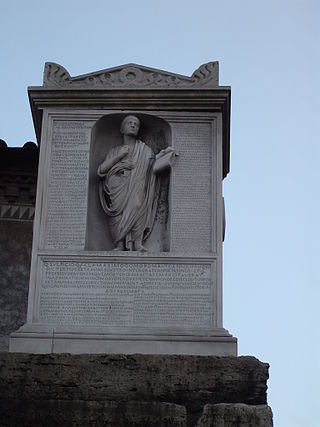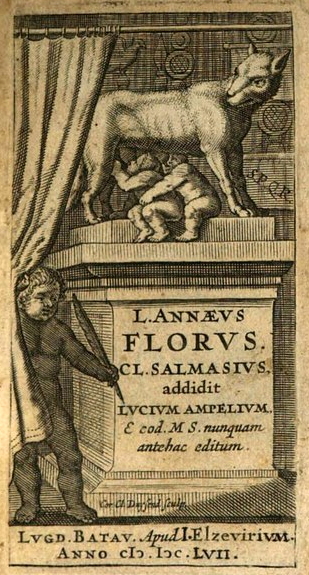
Recitationes were a literary practice of ancient Rome that involved one or more public readings (recitatio, pl recitationes) of a text. Some of these occurred in public places (theaters and baths), and even in the Roman Forum.

Recitationes were a literary practice of ancient Rome that involved one or more public readings (recitatio, pl recitationes) of a text. Some of these occurred in public places (theaters and baths), and even in the Roman Forum.
Before this public performance, authors would simply be known by their texts. These would be copied on scrolls by copyists, often freedmen of Greek origin, and were intended to be sold by these book publishers to wealthy people. [1] [2]
Starting towards the end of the Republic, the recitations developed substantially under the Empire, especially under the reign of Augustus, thanks to the poet and politician Gaius Asinius Pollio, who became well known because of the fashion for this new entertainment. The purpose of reading aloud in public was to make themselves known to an audience in order to obtain social and monetary protection; the recitations took place, for the most part, within privileged closed circles. [3]
Each person reciting was the protégé of a patron. The purpose of a reader was to secure his career by being the protégé of the wealthiest of patrons. The patron, a politician or wealthy public figure, paid his artist and commissioned works in which the patron was thanked; the latter could even appear as one of the characters in the text read. The orders were often intended to reproduce Greek works in Latin and in the Roman fashion of the moment. This Latinization of Greek literature was explicit: most Roman citizens, and at least all those who attended the recitations, were bilingual and knew Greek perfectly, a language of commerce and literature. Thus, in the Eclogues , Virgil takes up the Greek topos of the dialogue between shepherds of Arcadia and builds from there a poem in Latin meter.
Horace, Virgil and Propertius were all famous authors of recitations. Some famous verses of the Odes of Horace make clear the stake of a recitatio: to erect an artistic monument as did the Greeks and by taking again the elements of their literature; to remain for posterity as one who will have settled in Rome a Latin literature reproducing the Greek literature. [4]
Dactylic hexameter is a form of meter or rhythmic scheme frequently used in Ancient Greek and Latin poetry. The scheme of the hexameter is usually as follows :

Quintus Horatius Flaccus, commonly known in the English-speaking world as Horace, was the leading Roman lyric poet during the time of Augustus. The rhetorician Quintilian regarded his Odes as the only Latin lyrics worth reading: "He can be lofty sometimes, yet he is also full of charm and grace, versatile in his figures, and felicitously daring in his choice of words."
Latin literature includes the essays, histories, poems, plays, and other writings written in the Latin language. The beginning of formal Latin literature dates to 240 BC, when the first stage play in Latin was performed in Rome. Latin literature flourished for the next six centuries. The classical era of Latin literature can be roughly divided into several periods: Early Latin literature, The Golden Age, The Imperial Period and Late Antiquity.

Gaius Cilnius Maecenas was a friend and political advisor to Octavian. He was also an important patron for the new generation of Augustan poets, including both Horace and Virgil. In many languages, his name is an eponym for "patron of arts".

Publius Vergilius Maro, usually called Virgil or Vergil in English, was an ancient Roman poet of the Augustan period. He composed three of the most famous poems in Latin literature: the Eclogues, the Georgics, and the epic Aeneid. A number of minor poems, collected in the Appendix Vergiliana, were attributed to him in ancient times, but modern scholars consider his authorship of these poems to be dubious.

Venus is a Roman goddess whose functions encompass love, beauty, desire, sex, fertility, prosperity, and victory. In Roman mythology, she was the ancestor of the Roman people through her son, Aeneas, who survived the fall of Troy and fled to Italy. Julius Caesar claimed her as his ancestor. Venus was central to many religious festivals, and was revered in Roman religion under numerous cult titles.

Proserpina or Proserpine is an ancient Roman goddess whose iconography, functions and myths are virtually identical to those of Greek Persephone. Proserpina replaced or was combined with the ancient Roman fertility goddess Libera, whose principal cult was housed in the Aventine temple of the grain-goddess Ceres, along with the wine god Liber.
Lucius Accius, or Lucius Attius, was a Roman tragic poet and literary scholar. Accius was born in 170 BC at Pisaurum, a town founded in the Ager Gallicus in 184 BC. He was the son of a freedman and a freedwoman, probably from Rome.

Publius Papinius Statius was a Latin poet of the 1st century CE. His surviving poetry includes an epic in twelve books, the Thebaid; a collection of occasional poetry, the Silvae; and an unfinished epic, the Achilleid. He is also known for his appearance as a guide in the Purgatory section of Dante's epic poem, the Divine Comedy.
Gaius Asinius Pollio was a Roman soldier, politician, orator, poet, playwright, literary critic, and historian, whose lost contemporaneous history provided much of the material used by the historians Appian and Plutarch. Pollio was most famously a patron of Virgil and a friend of Horace and poems to him were dedicated by both men.
The Odes are a collection in four books of Latin lyric poems by Horace. The Horatian ode format and style has been emulated since by other poets. Books 1 to 3 were published in 23 BC. A fourth book, consisting of 15 poems, was published in 13 BC.

The history of Latin poetry can be understood as the adaptation of Greek models. The verse comedies of Plautus, the earliest surviving examples of Latin literature, are estimated to have been composed around 205–184 BC.

Greece in the Roman era describes the Roman conquest of ancient Greece as well as that of the Greek people and the areas they inhabited and ruled historically. It covers the periods when Greece was dominated first by the Roman Republic and then by the Roman Empire.

The Epistles of Horace were published in two books, in 20 BC and 14 BC, respectively.

Libra (♎︎) is the seventh astrological sign in the zodiac. It spans 180°–210° celestial longitude. The Sun transits this sign on average between September 23 and October 23. The symbol of the scales is based on the Scales of Justice held by Themis, the Greek personification of divine law and custom. She became the inspiration for modern depictions of Lady Justice. The ruling planet of Libra is Venus along with Taurus. Libra is the only zodiac sign that is represented by an object; the other eleven signs are represented by either an animal or a mythological character.

The Satires is a collection of satirical poems written in Latin dactylic hexameters by the Roman poet Horace. Published probably in 35 BC and at the latest, by 33 BC, the first book of Satires represents Horace's first published work. It established him as one of the great poetic talents of the Augustan Age. The second book was published in 30 BC as a sequel.

Alfenus Varus was an ancient Roman jurist and writer who lived around the 1st century BC.

Three main sets of works are attributed to Florus : Virgilius orator an poeta, the Epitome of Roman History and a collection of 14 short poems. As to whether these were composed by the same person, or set of people, is unclear, but the works are variously attributed to:

The Epodes are a collection of iambic poems written by the Roman poet Horace. They were published in 30 BC and form part of his early work alongside the Satires. Following the model of the Greek poets Archilochus and Hipponax, the Epodes largely fall into the genre of blame poetry, which seeks to discredit and humiliate its targets.

Miquel Costa i Llobera was a Spanish poet from Majorca. He mainly wrote in Catalan language and is regarded as a prominent figure of Catalan poetry.